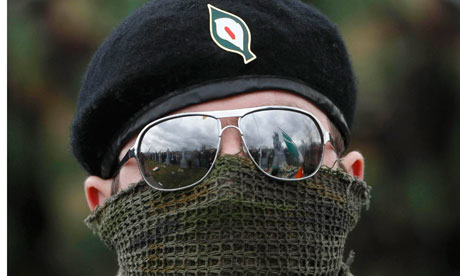Mary Fitzgerald writes for the Irish Times , her tweets filled with hatred for the Assad regime. Fitzgerald proud to boast she is running with the terrorists and that the Irish have now joined forces to bring Assad down....This is the NEW IRA. Fitzgerald 's latest tweet from a woman she claims asked her 'why has the world abandon her' ?. Fitzgeralds agenda , NATO strikes on Syria.
Republican dissidents join forces to form a new IRA
Exclusive: Merged organisation says it is planning to intensify attacks on security forces and other British-related targets

A masked member of the Real IRA at a republican Easter commemoration ceremony in Derry. The Real IRA is merging with other dissident groups in an escalation of the threat of violence against security forces. Photograph: Niall Carson/PA
Three of the four main dissident republican terror groups in Northern Ireland are to merge and reclaim the banner of the IRA, in an escalation of attempts to de-stabilise power sharing.
The Real IRA has been joined by Republican Action Against Drugs, which has been running a violent vigilante campaign in Derry, and a coalition of independent armed republican groups – leaving only the Continuity IRA outside the new group.
In a statement released to the Guardian, the new organisation claimed it had formed a "unified structure, under a single leadership". It said the organisation would be "subservient to the constitution of the Irish Republican Army".This is the first time since the 1998 Good Friday Agreement that a majority of the forces of dissident republicanism has coalesced.
Republican sources told the Guardian that the new paramilitary force included several hundred armed dissidents, including some former members of the now disbanded Provisional IRA who have been conducting a campaign of shooting and forcible exile of men in Derry City whom they accuse of drug dealing.
It also includes what the statement calls "non-conformist republicans", or smaller independent groups from Belfast and rural parts of Northern Ireland.
Republican Action Against Drugs and the Real IRA will cease to exist, one source close to the dissidents said.
The new organisation is planning to intensify terror attacks on the security forces and other targets related to what it regards as symbols of the British presence, according to the source.
Such targets could include police stations, regional headquarters of Ulster Bank, and the UK City of Culture 2013 celebration in Derry – which the dissidents have dubbed "normalising British rule".
In its statement the new group said: "In recent years the establishment of a free and independent Ireland has suffered setbacks due to the failure among the leadership of Irish nationalism and fractures within republicanism." This is a reference to the split between hardline republicans opposed to the peace settlement and Sinn Féin, which has followed a political strategy. Martin McGuinness of Sinn Féin, Northern Ireland's deputy first minister, was a leading figure in the Provisional IRA.
In a clear dig at Sinn Féin's participation in the power-sharing executive with unionists, the dissidents' statement said: "The Irish people have been sold a phoney peace, rubber-stamped by a token legislature in Stormont."
It said that the "necessity of armed struggle in pursuit of Irish freedom" against what it described as "the forces of the British crown", would only be avoided by the removal of the British military presence in Northern Ireland. It demanded "an internationally observed timescale that details the dismantling of British political interference in our country".
It also attacked the Northern Ireland secretary, Owen Paterson, over the arrest of several key republican figures, referring to him as an overlord. "Non-conformist republicans are being subjected to harassment, arrest and violence by the forces of the British crown; others have been interned on the direction of an English overlord. It is Britain, not the IRA, which has chosen provocation and conflict."
It is understood that among the republicans who have joined the new organisation are those responsible for the murder in April 2011 of Ronan Kerr, a Catholic recruit to the Police Service of Northern Ireland, and the terrorists who targeted Peadar Heffron, another Catholic police officer, who was seriously injured in January 2010 by a bomb which exploded inside his car as he was driving to his police station.
The recruitment of Republican Action Against Drugs activists in Derry marks a big step up in the terror campaign in the city. Dozens of former Provisional IRA members have been involved in shooting and intimidating mainly young Catholic men whom they accuse of drug dealing in Derry.
Republican Action Against Drugs' campaign has become notorious around the world since an investigation by the Guardian this year into the wave of shootings and forced expulsions in Northern Ireland's second city.
Republican factions
Until this week there were four separate violent groups opposed to Sinn Féin's peace strategy. As a result of this merger three republican terror groups have become one, reclaiming the banner of the IRA:The Real IRA was formed out of a split within the Provisional IRA (PIRA) in 1997 and was responsible for the Omagh atrocity a year later.
Republican Action Against Drugs (RAAD) – a group comprising ex-PIRA members whose purpose was to run an armed vigilante campaign against drug dealers. It has agreed to coalesce with other anti-ceasefire republicans.
Independent republican factions – until now an amalgam of terror groups operating in Northern Ireland. They are sometimes referred to collectively as Óglaigh na hÉireann.
Continuity IRA, the fourth republican faction, remains wholly independent.
The adoption of the name IRA is an attempt by the dissident republicans to reclaim from history the title of the movement that dominated republican politics in the 20th century. Since the Irish war of independence there have been several mutations of the IRA from a mass movement of armed fighters in the 1918-1921 Anglo-Irish war to a small band of diehards who conducted the 1958-62 border campaign. Its use has withered since the peace agreement in 1998.
http://www.guardian.co.uk/uk/2012/jul/26/ira-northern-ireland-dissident-republican-groups
